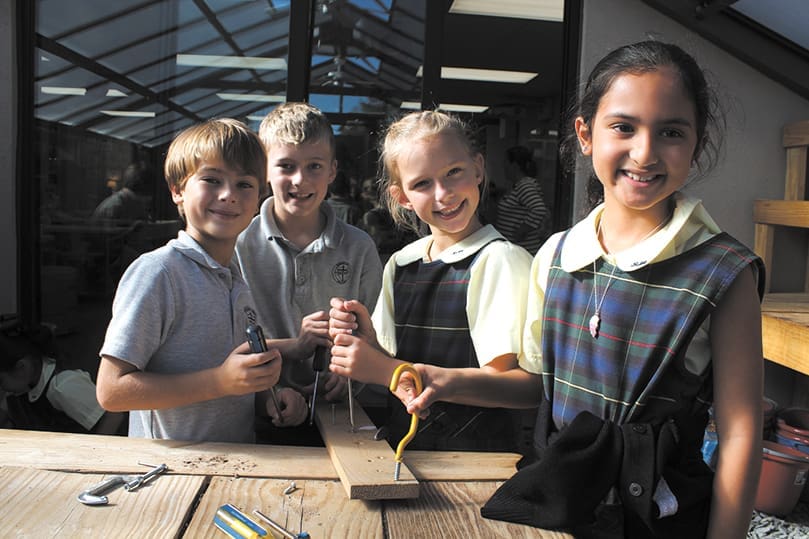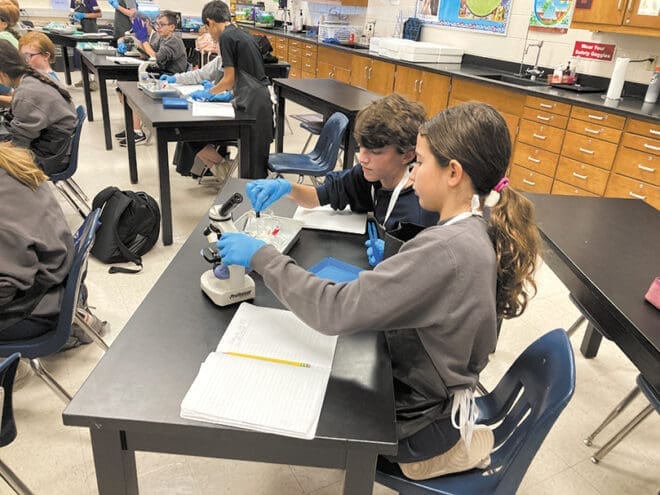 Photo Courtesy of St. Jude the Apostle School
Photo Courtesy of St. Jude the Apostle SchoolAtlanta
Three schools awarded Cognia STEM certification
By NATALIA DURON, Staff Writer | Published August 12, 2024
ATLANTA—Three archdiocesan schools earned the Cognia STEM (science, technology, engineering and mathematics) certification this summer, creating history as the first three institutions to achieve this status in the Archdiocese of Atlanta.
St. Jude the Apostle School, Sandy Springs; St. Joseph School, Athens; and St. Mary’s Academy, Fayetteville, were officially declared as Cognia STEM certified schools in May.
The Cognia STEM certification is awarded to schools that excel educationally in the subject areas and showcase a potential for continued success.
Achieving a Cognia STEM Certification requires an application, self-assessments from the candidate, onsite visitation, a review by the Cognia Global Commission and official approval of accreditation.
Cognia states that the curriculum of a high-quality STEM certified school embeds science, technology, engineering and mathematics in their program within and beyond the school day, has definitive expectations for their students to obtain a rigorous learning experience and focuses on performance-based learning.
St. Jude the Apostle School STREAM (science, technology, religion, engineering, arts and mathematics) lab teacher Elizabeth Bierly and computer technology teacher Therese Montesi led the application process for their school’s certification.
For 28 years Montesi has taught her students technological skills, so watching the program evolve as technology advances has made her proud of the school’s efforts to follow the world’s changes.
“Our technology programs used to only teach students about keyboards and typing,” she said. “And now, we introduce students to mass concepts like coding and robotics at a very young age. They know how to use a 3D printer, how to research and explain these topics.”
To Bierly, this award will help nurture St. Jude the Apostle school students to be strong individuals who will use their passion for STEM in careers.

St. Jude the Apostle School students Austin Blackburn and Addy Szczepanski collaborate on a STEM lab assignment in class. Photo courtesy of St. Jude the Apostle School
Brent Hollers, director of information technology at St. Mary’s Academy, said the entire process of certification prepared the program with the tools to build a new STEM structure that will be highly engaging and student centered.
“When our students graduate, go to college and find a career, they will have to use their creative problem-solving skills, and that was a big focus of what the accreditation process was,” he said. “We’ve gotten a clear picture of how to incorporate those skills into the program.”
As an already highly STEM-oriented school, Hollers said he is excited about how this certification will further engage students to be successful in their education.
“We are really focusing on effectively integrating all subject areas so that it’s not just a science lesson, but a full STEM lesson all together that has a broader global context that’s meaningful to the students,” he said.
St. Joseph School teacher Glorian Cardona won a $10,000 technology grant in June from the Rack Room Shoes Teacher of the Year program. Amy Pasko, St. Joseph’s director of technology, said this grant coincided perfectly with their certification, as their technological equipment will be refurbished.
“We want to gain more engineering and design tools like 3D printers, robotics and gardens so that our students will get more experience, and our curriculum will be stronger,” Pasko said.
Pasko said this certification will benefit the students by giving them the hands-on experience they need to combine their craving for STEM related lessons with their eagerness to learn.
“I realized one day that kids love Google, and they love getting answers very quickly,” she said. “But with the accreditation process and through our STEM program, we have all learned that it’s OK to make mistakes when we’re learning and not get a quick answer, because trial and error is good.”
The STEM certification is a status that many schools strive to gain, and though the process and anticipation can be daunting, Montesi said it is worth the wait.
“I encourage all schools to be a STEM certified school, because we are inspiring the next generation of kids to make a difference as Catholics and as scholars,” she said. “STEM and STREAM couldn’t be a better plan to protect and help God’s mission.”


